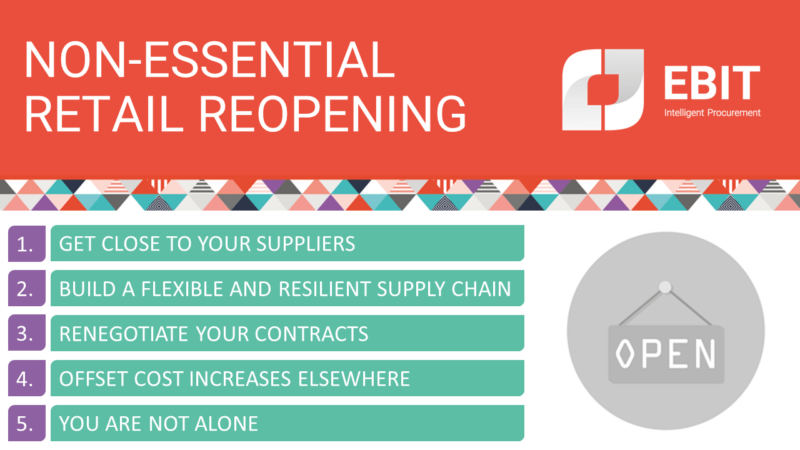Hot topic: Retail reopens its doors… Again!
After more than 14 weeks with doors closed, non-essential retail will reopen to customers again on the 12th April in England and Wales, with Scottish non-essential retail reopening later in the month. Whilst latest figures show overall retail volumes down 3.7% on a year earlier1, there are some huge variances by sector and by shopping channel which has added to the extremes that businesses and procurement teams have been challenged to deal with throughout this pandemic.
Supply chains have certainly been tested to the limits of what is possible at both ends of the spectrum. Clothing retail, at one end, has been hit hard with volumes falling by more than 50% on a year earlier1. For this sector it has been about shifting and exiting stocks whilst also keeping an eye on demand for new season ranges. This is particularly challenging for a sector that buys months ahead whilst not knowing what Covid would mean for volumes that far down the track. At the other end, non-food retail saw significant growth of over 16% year on year1, meaning that their supply chain challenges have been about sudden and significant spikes in demand and their ability to satisfy that, often where long product lead times are involved.
What does this mean for procurement?
Although product sits at the centre of supply chain activity there are also huge ripples felt around the edges. To give one example, elements such as packaging have needed to quickly flex up and down. Take the channel of online sales which has shown massive growth, jumping up from 22.1% of all retail sales prior to the pandemic to 32.9% just two months into it. These huge swings have a significant impact on stocks being in the right place and in meeting demand from the end customer. As a result, services such as couriers and the distribution network are under pressure to meet these demands.
All of the above is set against a backdrop where there is no particular precedent or forecast to inform, with the situation evolving on a regular basis. Procurement has therefore faced a very challenging year. With retail reopening and future uncertainly still likely, here are 5 things to consider in order to stay ahead:
1. Get close to your suppliers
If something is going to happen within an industry then the suppliers in that industry are likely to know about it first. Therefore, it is important to build a good relationship with your key suppliers and think about how you can best ensure that their knowledge is supporting you. Regular, structured meetings and the sharing of information to mutual benefit are two simple things that can offer great benefit. Similarly, involving suppliers in developing solutions can be a way to keep close and draw in more knowledge to benefit your business.
2. Build a flexible and resilient supply chain
Should you have all your eggs in one basket, or would you be better served from a strategy of multi-sourcing so that if one tap runs dry with product you have another to turn to? Is a small price advantage from a long lead time better than a slightly higher price from a short lead time? You could also consider bulking up on certain products and building in storage or hubs to smooth out any sudden moves in demand. It is worth considering the full picture throughout the supply chain and what is important to your business to shape the right solution that ideally allows flexibility.
3. Renegotiate your contracts
With so many changes in the supply chain, it’s potentially a great time to renegotiate with suppliers. An increase in demand means more buying power whereas a decrease in demand might be a good time to consolidate. Consider whether your contracts are giving you the flexibility you need. Is the balance of risk split fairly between you and your suppliers? It is worth considering whether your contracts meet your requirements in the here and now but also what you need for the future. Another consideration here is contract management – do you know what contracts you have in place? When do they renew or terminate?
4. Offset cost increases elsewhere
Commodity costs are one example currently where prices are hugely volatile. Directs procurement is seeing significant inflation is some spend areas. Could this be offset though procurement in other areas? Indirects may present opportunity to offset a portion of the increase by renegotiating and reducing costs there.
5. You are not alone
In such an extreme year the challenges have been immense. It is important to know that you are not alone and the majority of businesses and individuals have all faced challenges. Use your network to share ideas and information and support each other. Draw in external support too if this is right for your business. For example, at Ebit we have supported a large number of businesses in various sectors with our procurement services. On average we deliver a 5/1 return on investment so working with us has meant for our clients that the results far exceed the costs involved. We have a large amount of insight, benchmark data, and expertise and so can usually fast track support for your business. We also have our own contract management system which many clients use to store and manage contracts so that you know what procurement activity lies ahead.

